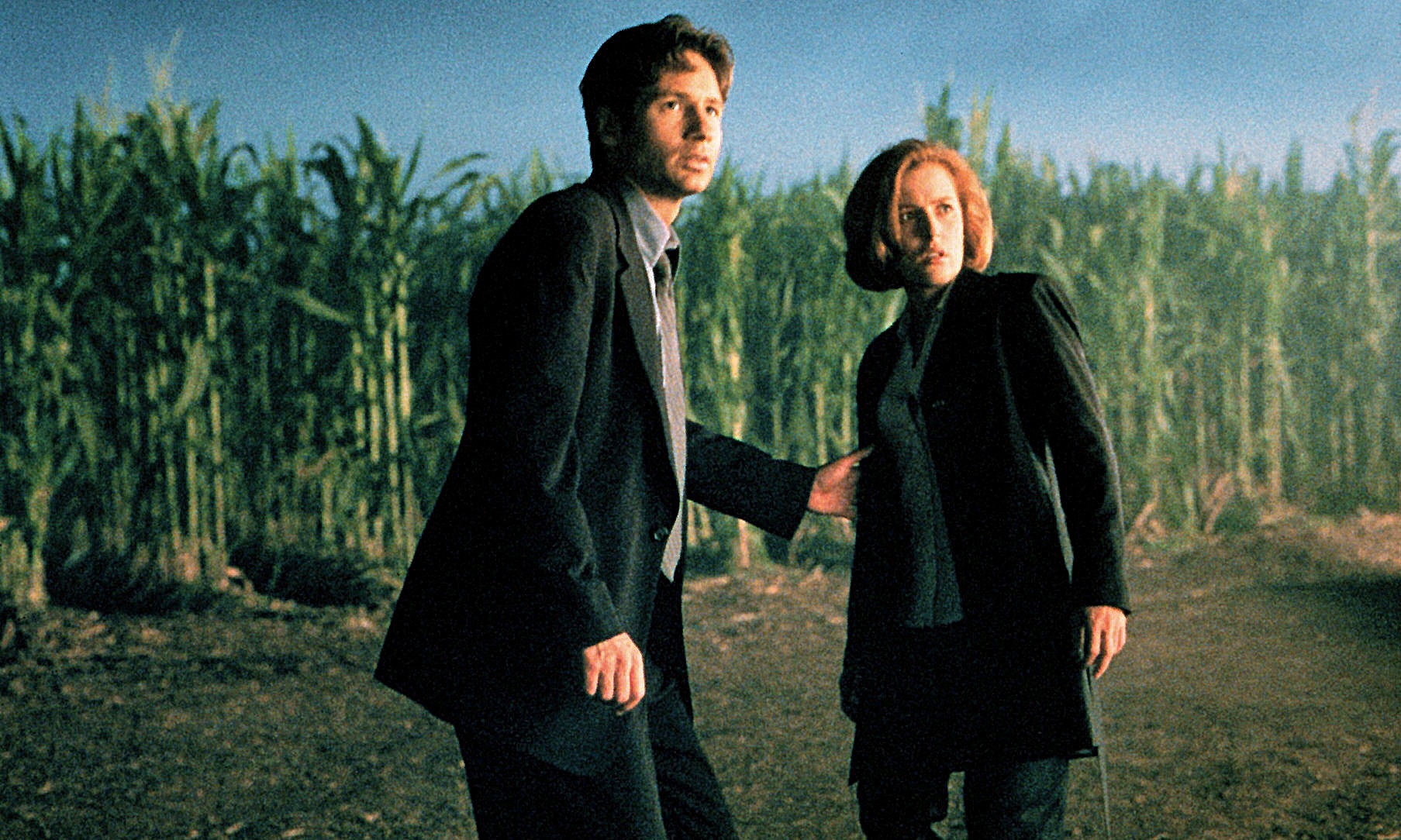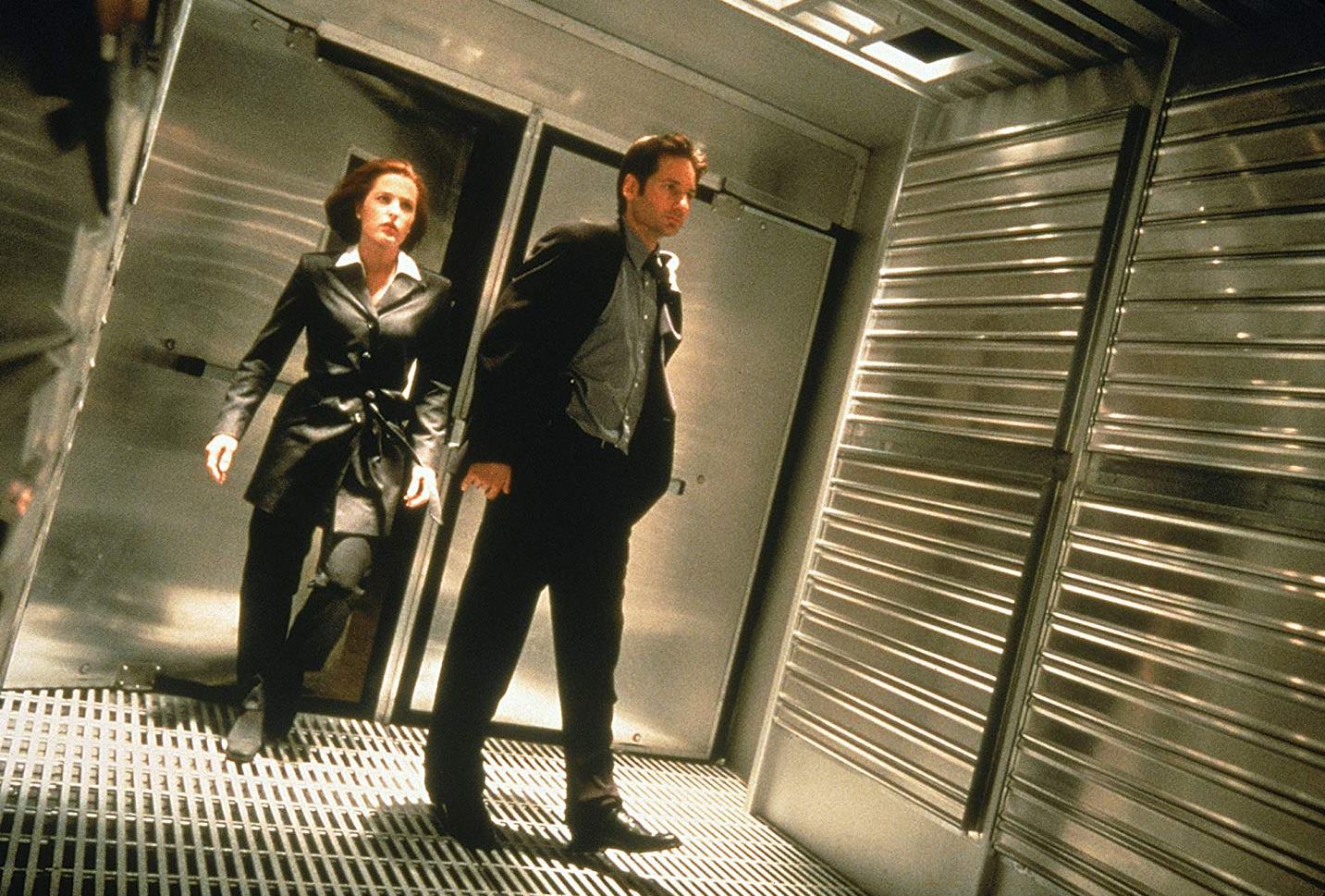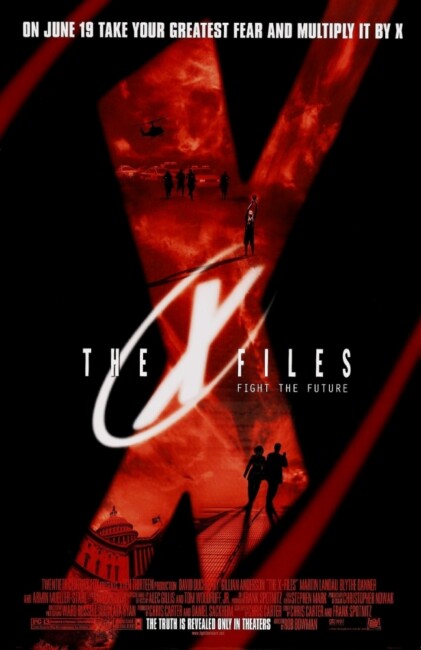aka The X-Files; The X Files: Fight the Future
USA. 1998.
Crew
Director – Rob Bowman, Screenplay – Chris Carter, Story – Chris Carter & Frank Spotnitz, Producers – Chris Carter & Daniel Sackheim, Photography – Ward Russell, Music – Mark Snow, Visual Effects Supervisor – Mat Beck, Visual Effects – Blue Sky/VIFX (Supervisor – John Nash), Light Matter Inc/Pixel Envy, Todd-AO/Hollywood Visual Images (Supervisor – Pete Kozcera), Federal Building Sequence – Hunter-Gratzner Industries, Miniature Effects Supervisor – Scott Schneider, Special Effects Supervisor – Paul Lombardi, Makeup Effects – Amalgamated Dynamics (Supervisors – Tom Gillis & Alec Woodruff Jr), Prosthetic Makeup Effects – Lance Anderson & Craig Reardon, Additional Makeup Effects – Kurtzman, Nicotero, Berger EFX Group Inc, Production Design – Christopher Nowak. Production Company – Ten Thirteen Productions.
Cast
David Duchovny (Special Agent Fox Mulder), Gillian Anderson (Special Agent Dana Scully), Martin Landau (Dr Alvin Kurtzweil), John Neville (Well-Manicured Man), William B. Davis (Cigarette-Smoking Man), Mitch Pileggi (Assistant Director Walter Skinner), Blythe Danner (Jane Cassidy), Terry O’Quinn (SAC Darius Michaud), Armin Mueller-Stahl (Conrad Strughold), Jeffrey DeMunn (Dr Ben Bronschweig), Lucas Black (Stevie Richardson), Dean Haglund (Langley), Bruce Harwood (Byers), Tom Braidwood (Melvin Frohike)
Plot
FBI agents Fox Mulder and Dana Scully of the defunct X Files paranormal investigation division are brought before an investigating committee, blamed for negligence after a bomb defusal at a Federal building in Dallas goes wrong and the building is destroyed and lead agent Darius Michaud with it. Agent Mulder then encounters a conspiracy fanatic Alvin Kurtzweil who provides him with information that leads Mulder to discover that the explosion was a ruse to destroy several bodies infected with a prehistoric alien virus that had been uncovered in Texas. As they investigate, an international cabal working in collaboration with alien invaders to unleash the virus, seeks to stop Mulder by infecting Scully.
In the same way that we can now look back at the frenetic outpouring of alien invasion and atomic monster films of the 1950s with a fascination at just how much they reflect the insecurity of the times, future historians will no doubt similarly look back at the incredible outpouring of paranoia and conspiracy films and tv series of the 1990s as indicative of something deeply upsetting about the decade. For if this body of films and tv series is any reflection of the way we think, then society is surely rent to the darkest places of the soul by a sense of distrust and paranoia; a loss of identity; a recurrent belief that the government is covering up the truth; the certainty that there is something fundamentally rotten at the heart of many respected social institutions; and the recurring surety that some golden past has been inevitably corrupted and that society is falling towards a moral collapse. The widespread prevalence of these sentiments (at least in the American media) and the darkness of their presentation is something that borders on the positively pathological.
Blame it all on Oliver Stone and JFK (1991), which started the conspiracy/loss of the American dream thing off. (A substantial number of these films and series start the beginning of the corruption of American society with the Kennedy assassination). However, it was the tv series The X Files (1993-2002) that tied the conspiracy angle to alien abductions and the great conspiracy junkie conviction that something happened in Roswell, New Mexico in 1947. As a tv series, The X Files conducted with considerable wit and elegance a number of fresh and inventive takes on traditional and not-so-traditional forms of ghost and monster stories. Beneath the series was a cool, shadowy conspiratorial edginess that touched a nerve of 1990s alienation that seemed like it could be real – and indeed was something that made The X Files into a cult phenomenon. What does strike one about The X Files – and other series that sought to imitate it like Nowhere Man (1995), Dark Skies (1996-7) and First Wave (1998-2001) – is the novelty of their storytelling – they are the only series where the hero/heroine lose each week. Indeed, despite the proclamation “The truth is out there” over the credits of The X Files, the format of the series was dependent on the truth never being uncovered (or more commonly partial glimpses uncovered and then all evidence removed before .it can be proved to anyone else).
The X Files (or else The X-Files if you read the end credits and The X Files: Fight the Future according to the promotion) was an attempt to spin the series’ cult popularity out into a cinematic franchise. Unfortunately for the popularity of the series on the small screen, the film met with disappointing box-office performance. There are an interesting number of comparisons that can be made between The X Files movie and Star Trek: Generations (1994) – both are remarkably similar in the way they were made and the problems they contain. Both were construed as the initial attempts to launch a popular tv series as a cinematic franchise; both were made very close to the end of shooting schedules on the tv series; both were disappointments with their intended fan audiences; and both seem uncomfortable with the widescreen format, looking more like feature-length tv episodes than films that have been designed as big-screen features.

The X Files seems uneasily caught between trying to offer up the series’ cultists what they expect of it and trying to reiterate the gist of the series all over anew for any audience members that may have wandered in not having seen the series – and the film ended up pleasing neither crowd as a result. Indeed, a good part of the film’s approach and a substantial portion of its predicted earnings was gambled on attracting new fans in the theatres. On the other hand, a good part of the reason for the film’s lack of expected box-office take may well be that its advertising campaign was gambled entirely on selling the film to the fan audience rather than seeking to attract new audiences. All the advance information that new audiences were given was simply a poster that told one nothing at all about the film. Details of the plot were kept under a screen of absolute secrecy until the film’s release. The stills available seemed the dullest imaginable – only a variety of shots of Mulder and Scully walking down corridors and in bare fields. One suspects that such an approach ended up being counter-productive – that it created a film that nobody knew anything about except those guaranteed to be drawn by the series brand name. In all likelihood, the film’s lack of success was this critical miscalculation in its promotional campaign.
The story in the film seems a reshuffling of the basic plot developments and cliches of the first three seasons of the series. Stop me if you have heard this before:– not one but two different people involved on the inside of the big conspiracy and/or claiming connection to Mulder’s father accost him in back alleys to provide cryptic information; the FBI seek to close down the X Files; the FBI conduct Internal Affairs investigations where blame is placed on Mulder and Scully as part of a coverup; Mulder and/or Scully are on the verge of giving up altogether in the face of the overwhelming attempt to silence them until a fresh piece of alien evidence and conspiratorial activity sets them on the trail anew; Scully is infected with a disease to which there is no known medical cure; Scully is abducted; Mulder must trek all the way to an alien base hidden under the polar ice caps; alien DNA is uncovered in the remains of cavemen; innocent boys are infected by the Black Oil and the incident quickly covered up; the cabal meets in shadowed rooms and in cryptic terms plot massive coverups and how to silence Mulder; mysterious viral experiments are being conducted on the unwitting populace and so on.
The problem with The X Files as a tv series is that it started superbly with inventive one-off stories and its spooky, shadowy glimpses into the dark places operating behind the government. At the time the film came out, the series had been riding at an absolute artistic peak and conducting some of the best one-off stories – Musings of a Cigarette Smoking Man, Home, Postmodern Prometheus, Bad Blood to name but a handful. Where it tended to fall down was when it came to its continuing elaboration of its mythology and backstory. Unlike its contemporary Babylon 5 (1993-8), which had a similarly complicated and elaborate series of unfolding revelations, you got the feeling The X Files was building a rickety structure as it went along rather than adhering to a coherent preplanned grand schema. By the end of the series’ run, the backstory had become so complicated it was near impossible to keep track of all the subplots involving black oil, alien wars, clones, shape-changing assassins, alien abductions and implants, who is who’s father and sibling, and all the conspiracies within the conspiracies.
The same problem spills over here. The film is stuck with a sprawlingly complicated plot that tries to encompass everything but more than anything ends up showing the increasing cracks in the scenario’s believability. It seems filled with an absurd number of holes, implausibilities and unanswered questions – Why does Terry O’Quinn agent-in-charge allow himself to be blown up along with the bomb inside the Federal building (one is unable to work out why, even assuming he was involved in the conspiracy, it was necessary for him to sacrifice his life)?
The cabal’s plan to take Scully away from Mulder is built on such a series of complicated coincidences as to seem preposterous – that Mulder and Scully will find the sealed area hidden under a children’s playground, that they will manage to choose the correct direction to follow a series of departed trucks in the middle of nowhere, that they will then discover the domes in the cornfield, will enter and then Scully (as opposed to Mulder who is equally unprotected) will be stung by the virus-carrying bees, whereupon the cabal will be waiting outside Mulder’s apartment (as opposed to her own) posing as fake ambulance men, having tapped his 911 call in order to abduct her when she collapses. The revelation that what the conspiring cabal has been so ruthlessly fighting for all these years is to sit back so an alien virus can enslave the entire human race seems rather laughable.

The X Files is also disappointingly lacking in many of the things that made the series memorable. There is none of the ingenious plotting development or plausibly contrived explanations of just how the paranormal might exist, while the laconic sense of humour between the two characters that drove the series is conspicuously lacking for the most part. The things that the film seems to think the series depended on – the dark, paranoid claustrophobic visual look and the tight, constricted plotting – fail to work up on the big screen. The dark, shadowy look that works so well on the small screen seems cramped when translated to the big screen. The tight plotting designed for a 50 minute tv hour keeps the film turning so tightly that one is too busy trying to follow what is meant to be going on to become involved.
What The X Files needed to work as a film is to be opened up for the big screen – surely the one thing it was hoping to offer that the series couldn’t – but it never does. Director Rob Bowman, a veteran from the series, offers up a few shots of wide open desert, snowy wastes and big domes but there seems sadly almost no difference between the look of a two million dollar tv episode and a 60 million dollar film. There is an impressive special effect of a UFO rising at the climax but visual effects supervisor Mat Beck, also a veteran of the series, seems to have conducted it as though he were still working on a limited tv budget and its appearance seems more cursory than awe-filled.
The failing of the film is many of the failings of the tv series writ large. Like the big controversy that circulated the fandom before the film’s release – would the underlying sexual tension between the two characters be fulfilled? – The Big Kiss here is all tantalising tease that at the last moment deftly ducks away from delivery of anything. What we likewise have is a film that gives the appearance of answering all the big questions that lie behind the series – the advertising campaign “Fight the Future”, while the lead up of plot strands from the previous season promised the grand concept of an alien war – but equally dances away from actually delivering anything. It teases but instead in the end all that The X Files resorts back to is the series’ status quo – the conspiracy’s current plan is thwarted but all evidence that might be used to prove anything is eliminated; Mulder and Scully are reinstated but no further ahead in proving anything than they were at the very start of the series; and the truth still remains out there ever elusive.
(In an amusing piece of trivia:– one wonders if any fans of Star Wars (1977) picked up the in-joke aimed at them in the last scene. Featured is the title credit ‘Foum Tatouine, Tunisia’. Tunisia, of course, was the location where George Lucas shot all the Tattooine scenes for Star Wars).
An X Files theatrical sequel was talked about for a number of years and eventually emerged as the heavily disappointing The X Files: I Want to Believe (2008). The X Files underwent a six-episode revival in 2016, followed by a full series in 2018, although this was cancelled after ten episodes. With Gillian Anderson announcing she would be leaving the show, this appears to have put paid to any further series.
The X Files was Rob Bowman’s second outing as a feature-film director – he had earlier made the rollerblading film Airborne (1993). Bowman next went onto helm the dragon film Reign of Fire (2002), followed by the Marvel Comics adaptation Elektra (2005), as well as two episodes of the Stephen King anthology mini-series Nightmares & Dreamscapes: From the Stories of Stephen King (2006).
Outside of The X Files, creator Chris Carter has enjoyed extremely mixed success. He made the consistently interesting tv series Millennium (1996-9), which suffered from a crucial lack of conceptual focus, starting off about a serial killer profiler before tracking off into mystical directions trying to analyse the millennial zeitgeist. His other works include the also highly interesting Virtual Reality series Harsh Realm (1999), which was cancelled after nine episodes, and the X Files spinoff The Lone Gunmen (2001), which was also cancelled after thirteen episodes. Carter subsequently wrote/directed another science-fiction pilot The After (2014) that failed to go to series and then returned to the The X Files revival in 2016.
Trailer here


